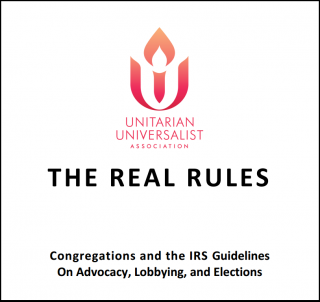Religious Activism: Political, Not Partisan
By Rachel Collins
Unitarian Universalists have a long history of political activism and public witness on a wide variety of social justice issues. Are you or your congregation interested in becoming more politically active? Do you have questions on what is and isn’t allowed especially as it relates to your congregation’s nonprofit status? Here are some points to keep in mind in order to effectively engage politically without being partisan on behalf of your values:
Issues
Congregations or their representatives are completely free to publicly advocate for or against any issue. Examples of issues include voting rights, civil rights, living wages, gender equity, climate change, religious freedom, LGBTQ rights, migrant justice, global human rights, reproductive justice, indigenous rights, racial justice, refugee support, and so much more.
Legislation
Congregations and their representatives can engage in legislative advocacy or lobbying—defined by the IRS as advocating for or against specific pieces of legislation—if it is an “unsubstantial” portion of an organization’s activities. Given all the activities of a busy congregation, it would be highly unlikely for the advocacy or lobbying to constitute a substantial portion of congregational activities. For example, a congregation may petition a city council, state legislature, and/or Congress to pass a law to reduce carbon emissions or stop racial profiling. It is important for congregations to consider how proposed legislation upholds or would be in violation of our faith values when developing key talking points. Consult “The Real Rules” for more details about guidelines related to congregational legislative advocacy.
Elections
If they want to maintain their nonprofit status, no congregations or their representatives may advocate for or against a candidate (or political party) up for election. Even sudden involvement in issue advocacy during an election can be viewed by the IRS as violating the nonprofit status exemption if the issue is closely tied to the election or one or more of the candidates.
Congregations or their representatives still have the right to hold individual public figures accountable and support or oppose issues, but that advocacy should extend beyond a specific election. This is where having a documented history of advocacy will be important.
Congregations or their representatives can advocate for or against presidential nominees to cabinet positions, the Supreme Court, or any others that require legislative confirmation. Presidential appointments that require legislative confirmation are considered lobbying by the IRS (which is permissible within certain limits) rather than partisan campaign intervention (which is totally prohibited).
History of Advocacy
An important factor in determining the appropriateness of political activity is whether the congregation or their representatives has a documented history of advocacy on an issue, law, or public figure. This helps show that a person or group is not simply trying to affect an election’s outcome or the vote on a specific piece of legislation. It shows that a specific instance of advocacy is part of a larger commitment to ongoing issue advocacy.
Representing a Congregation
Individuals are free to express their personal views on any issue, piece of legislation, and political candidate. Individuals come under scrutiny by the federal government when they use their position as a representative of a congregation to engage in political advocacy during an election that could be construed as campaign intervention, supporting or opposing a specific candidate, or as a substantial part of church activity. To reassure yourself and others that your opinions are your own, simply state that clearly during any political discussion. For online discussions, it can be helpful to include a statement like the following in your user profile or in your page’s About section: “All of the opinions expressed here are my own and not those of my employer or of any other organization.”
Learn More
These are some key considerations for engaging religious political activism. Check out the UUA’s guide for religious political activism, “The Real Rules,” to learn more. Now get out there and get your voice heard!


